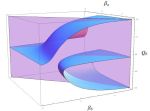EPJ B Highlight - Averting worse economic collapses
- Details
- Published on 01 July 2013

A new study shows how specific parameters can help us steer clear of tipping points in dynamic systems, such as entire economies.
By managing macro-economic parameters, scientists believe that—unlike previously thought—it is possible to steer an economy around irreversible changes in its complex dynamics and avert potential economic disasters. These findings, just published in EPJ B, stem from the theoretical work of Michael Harré and colleagues at the Complex Systems Group at the University of Sydney, Australia.
Physicists have a long experience of using statistical mechanics to study equilibrium points and small fluctuations in large numbers of interacting particles under varying pressure and temperature conditions. By applying statistical-mechanics methods to economic game theory, it is possible to describe the strategic interactions between, say, businesses which are influenced by their own incentives as well as the incentives of third parties.
By changing a macro-economic parameter like tax rates, previous research has shown the system will usually move away a little from where it had settled, but not much. Their new results show that such optimisation can produce a tipping point where a change in the tax regime, for example, will cause the whole economy to suddenly collapse.
Harré and colleagues found that it is possible to find a steady state in the specific scenario where the contributions each business makes to the whole economy are maximised in terms of financial return. And even if an economy is drifting inexorably towards a tipping point, they showed that small perturbations of the system parameters can move an economy around a tipping point, thus averting it.
The ability to exert control on economies depends on having sufficient control of the system parameters—potentially addressed by empirical research, and knowing where the economy is relative to these tipping points—provided by recent measuring techniques.
M. S. Harré, S. R. Atkinson, and L. Hossain (2013), Simple Nonlinear Systems and Navigating Catastrophes, European Physical Journal B, DOI 10.1140/epjb/e2013-31064-x




